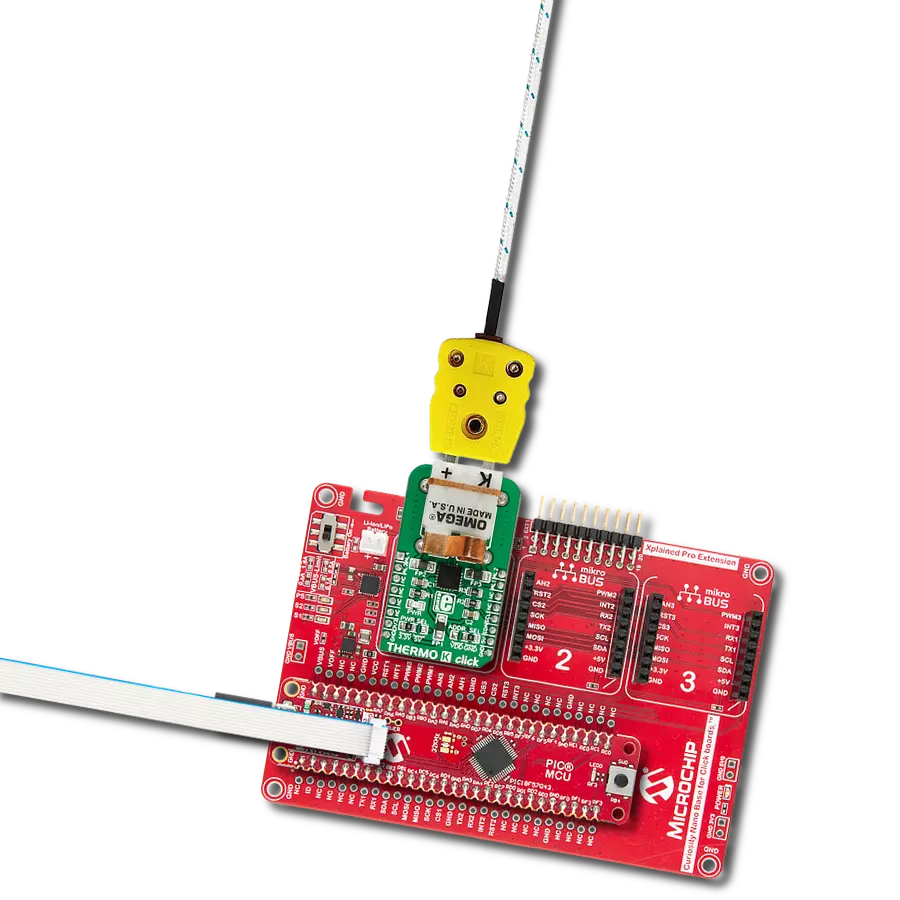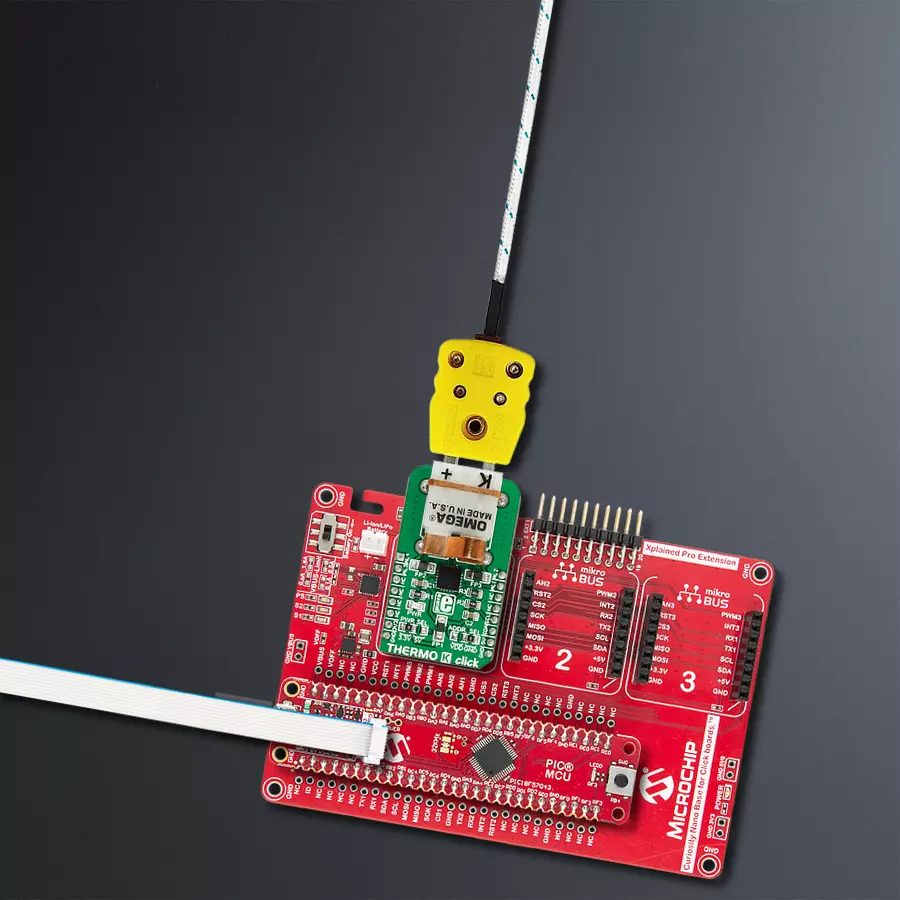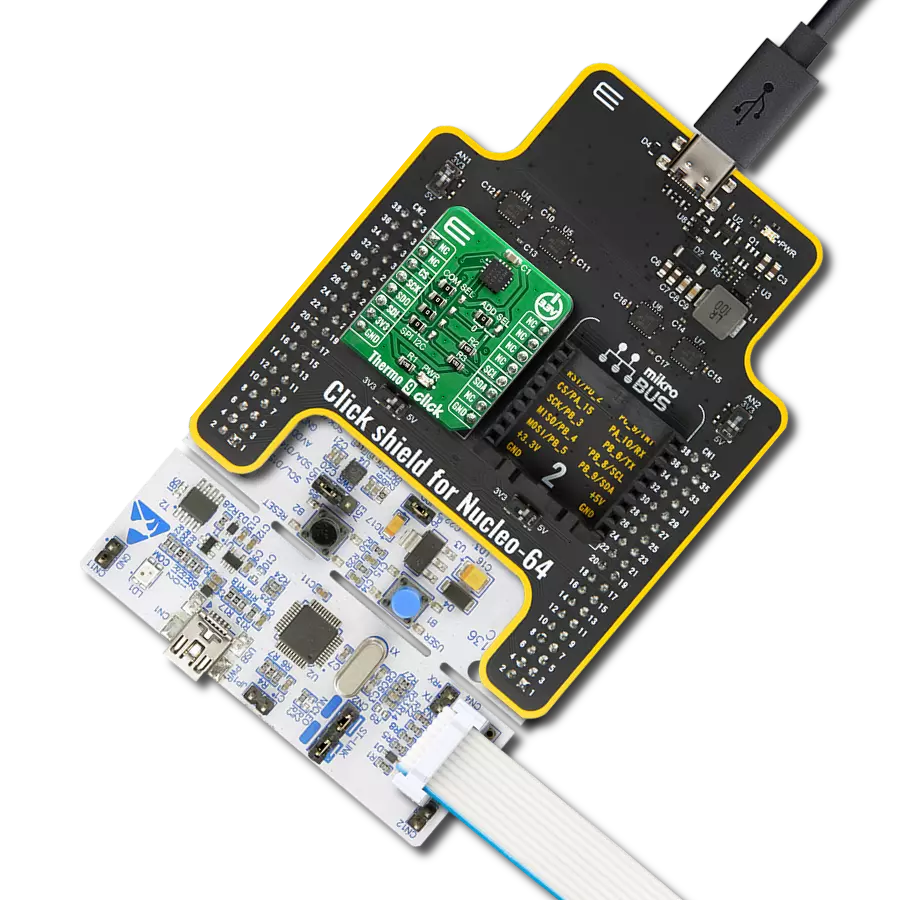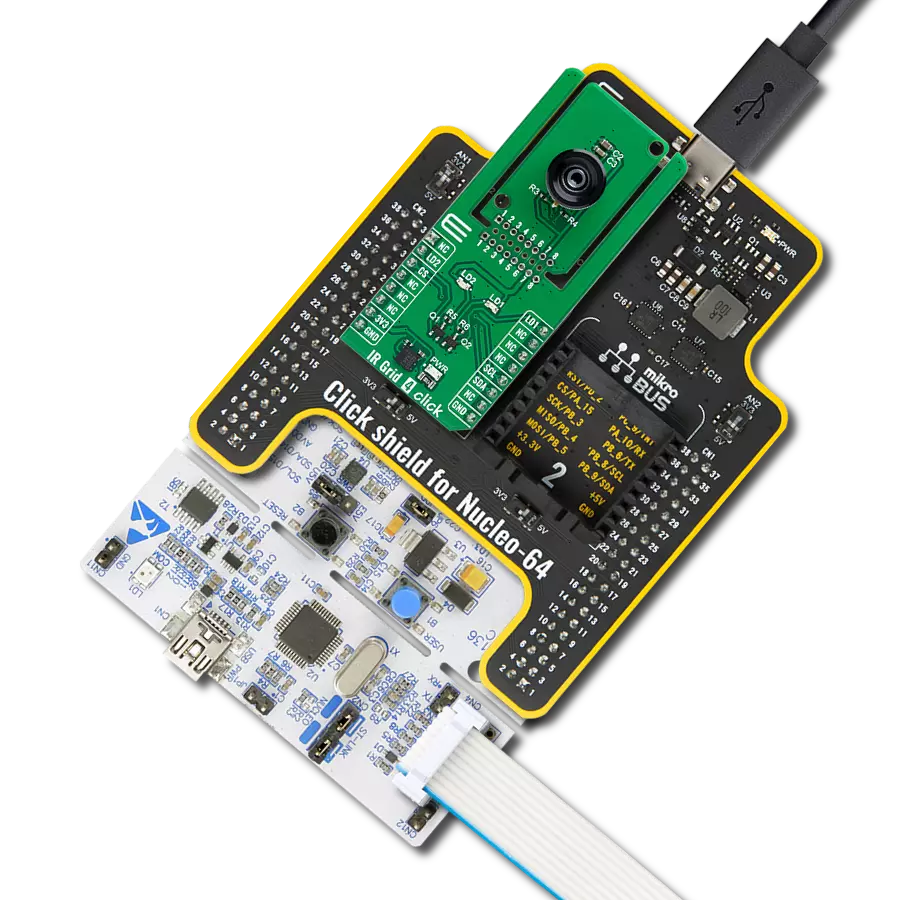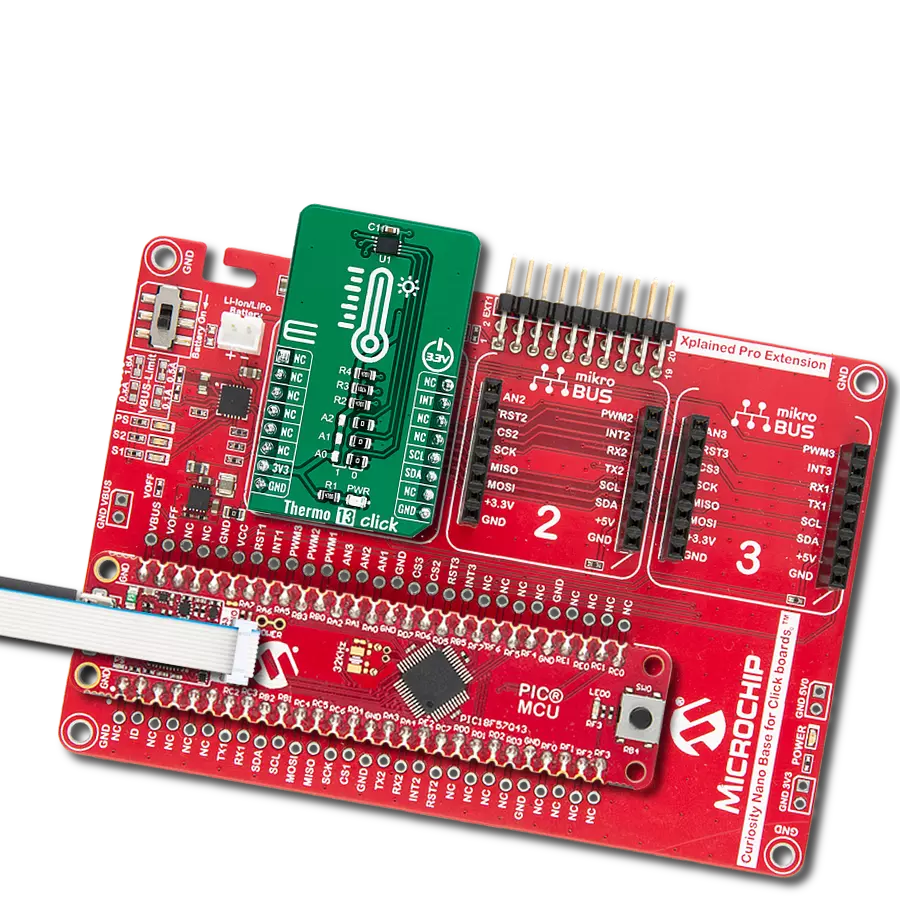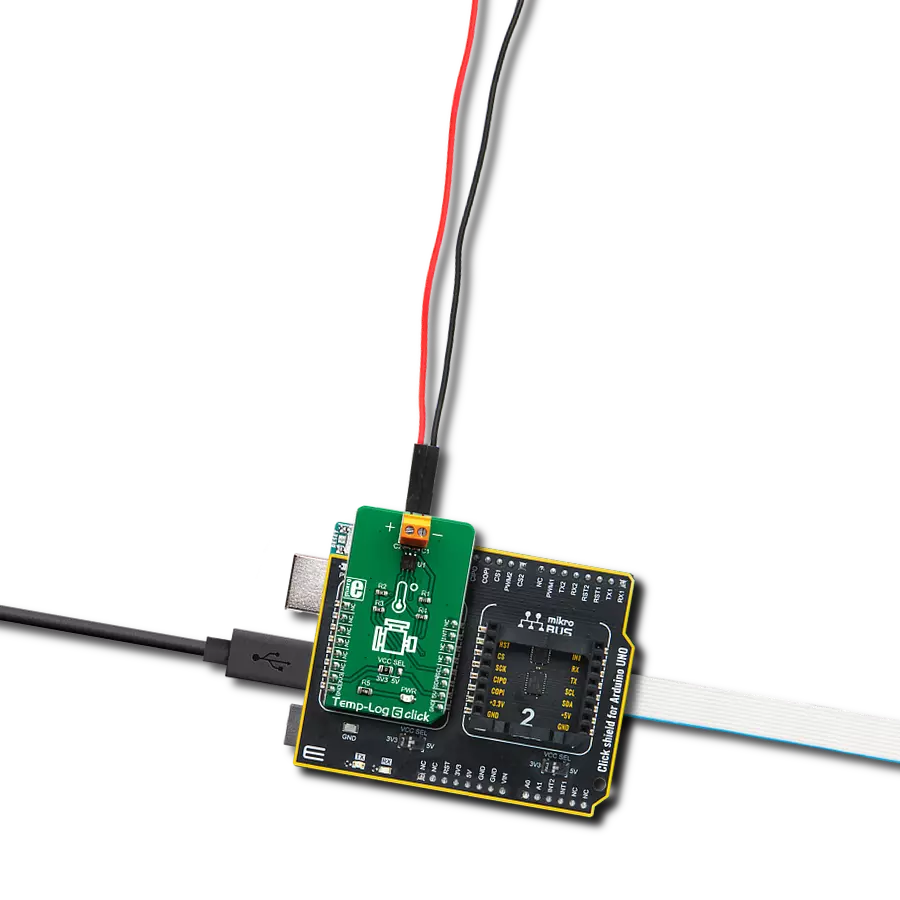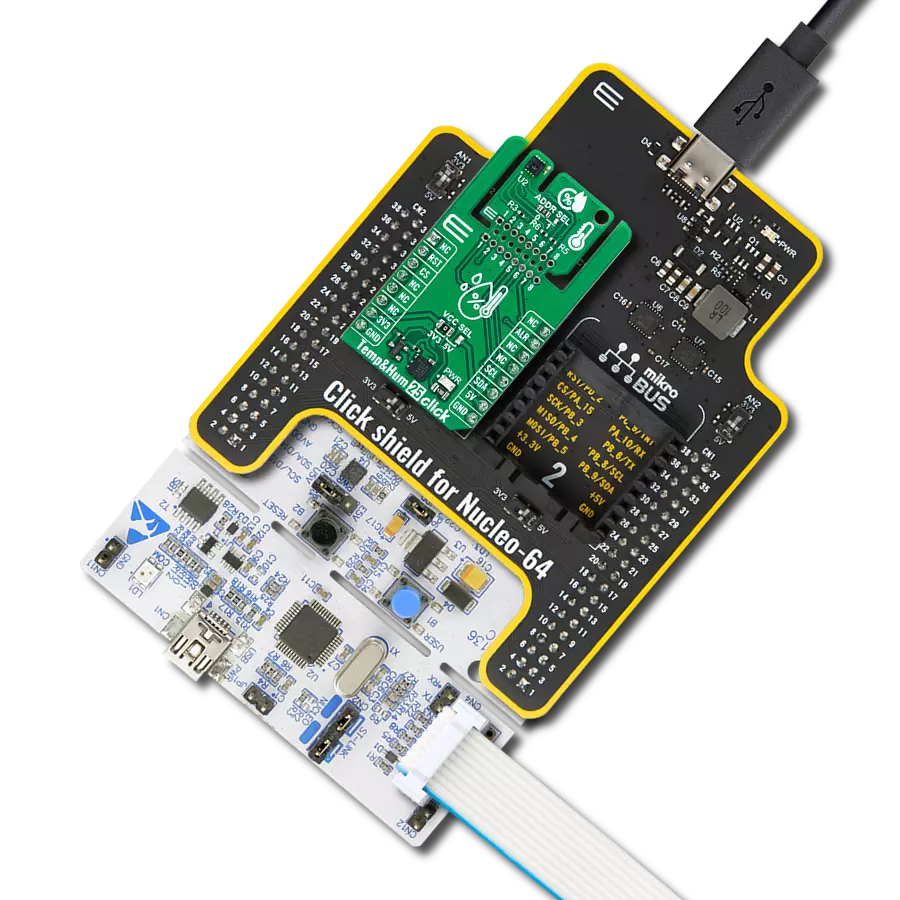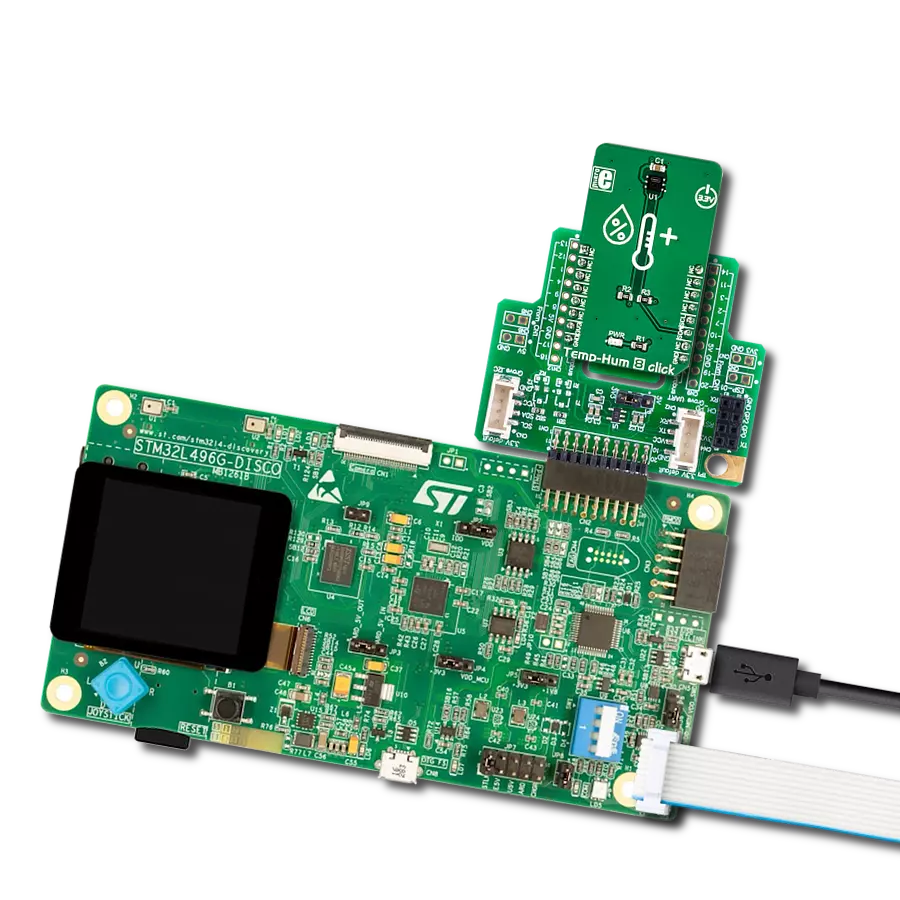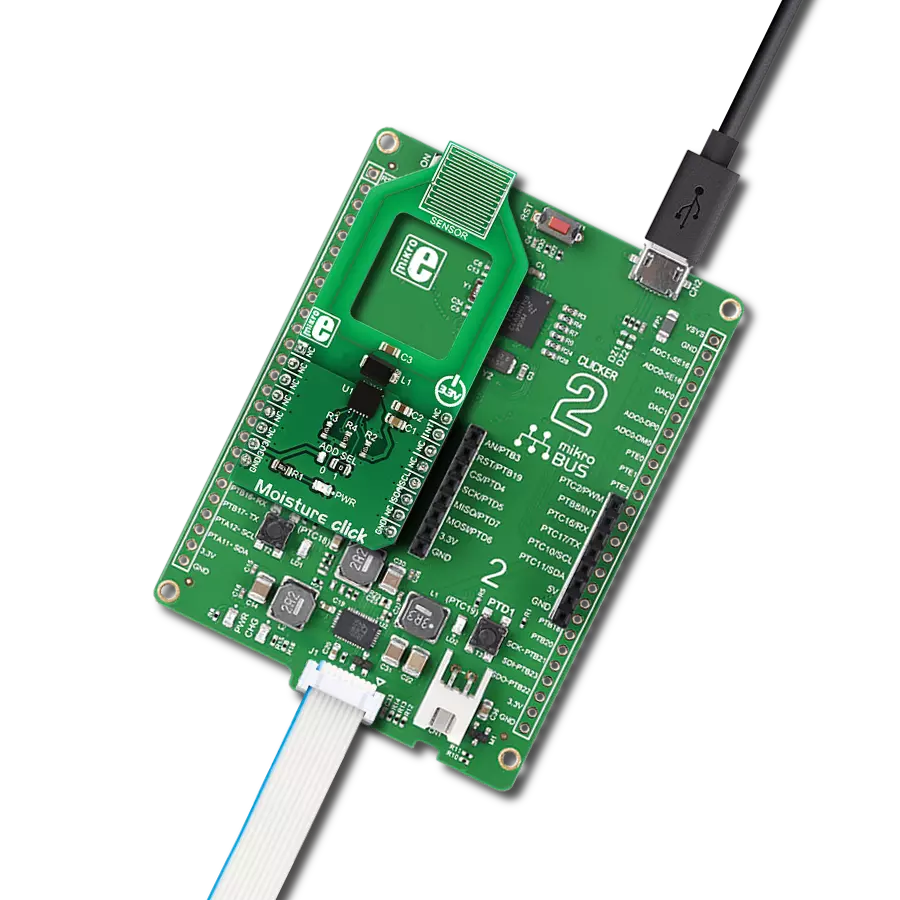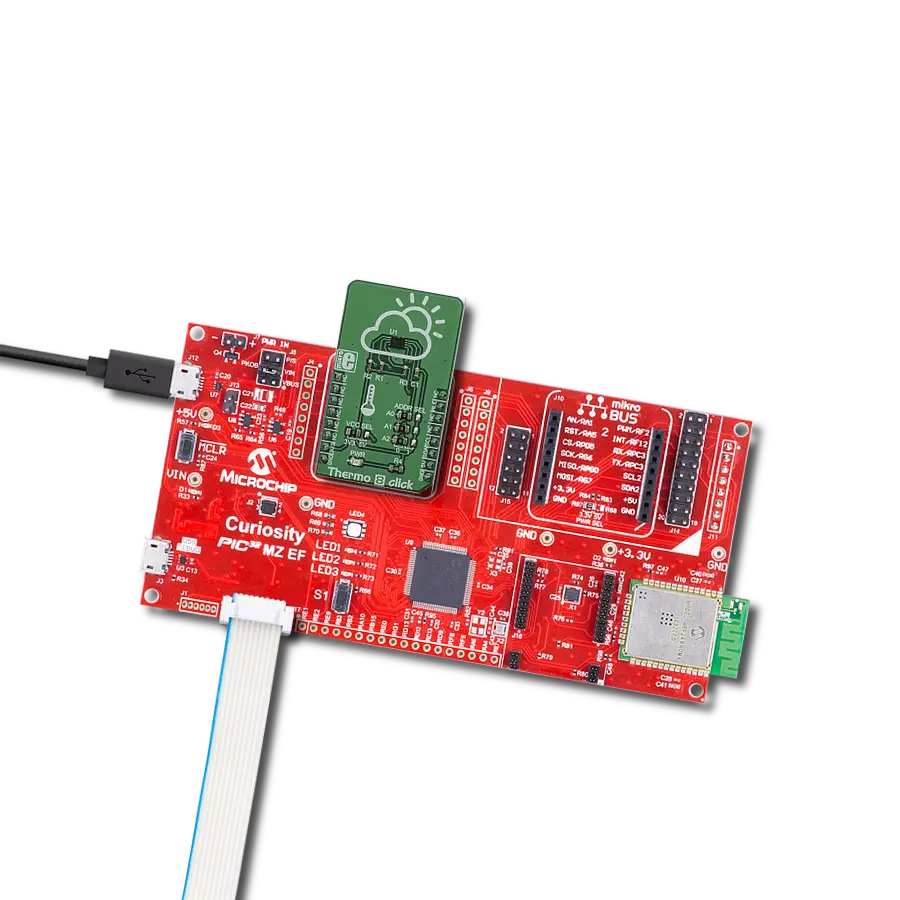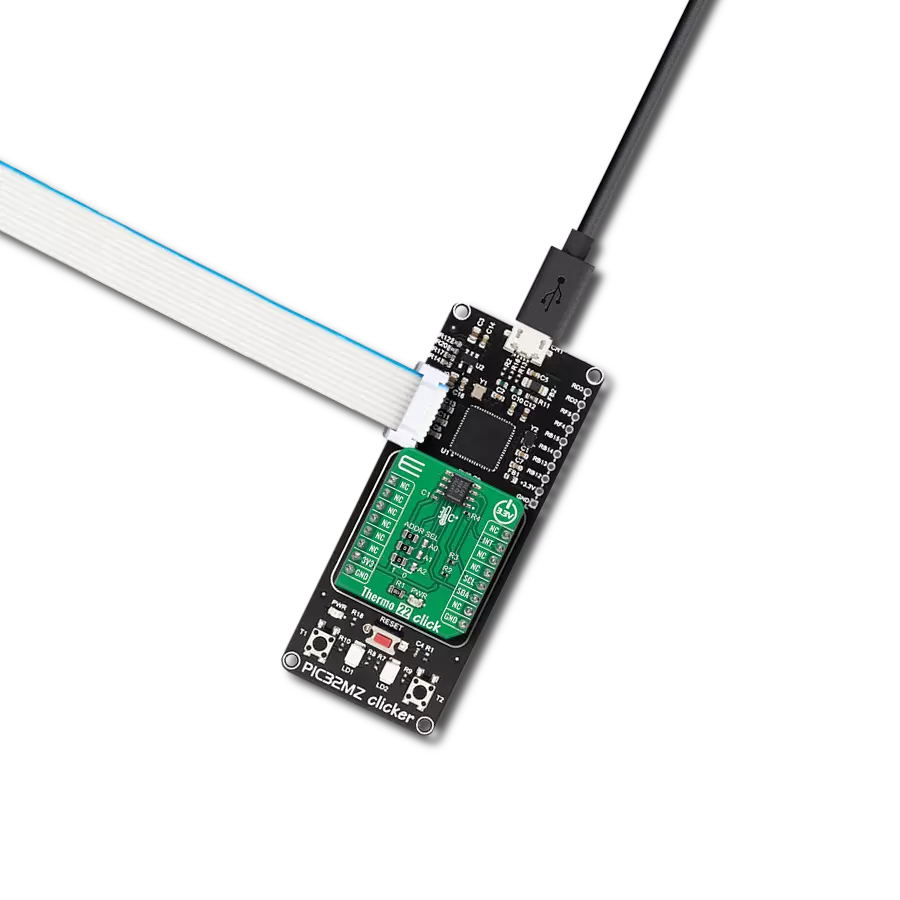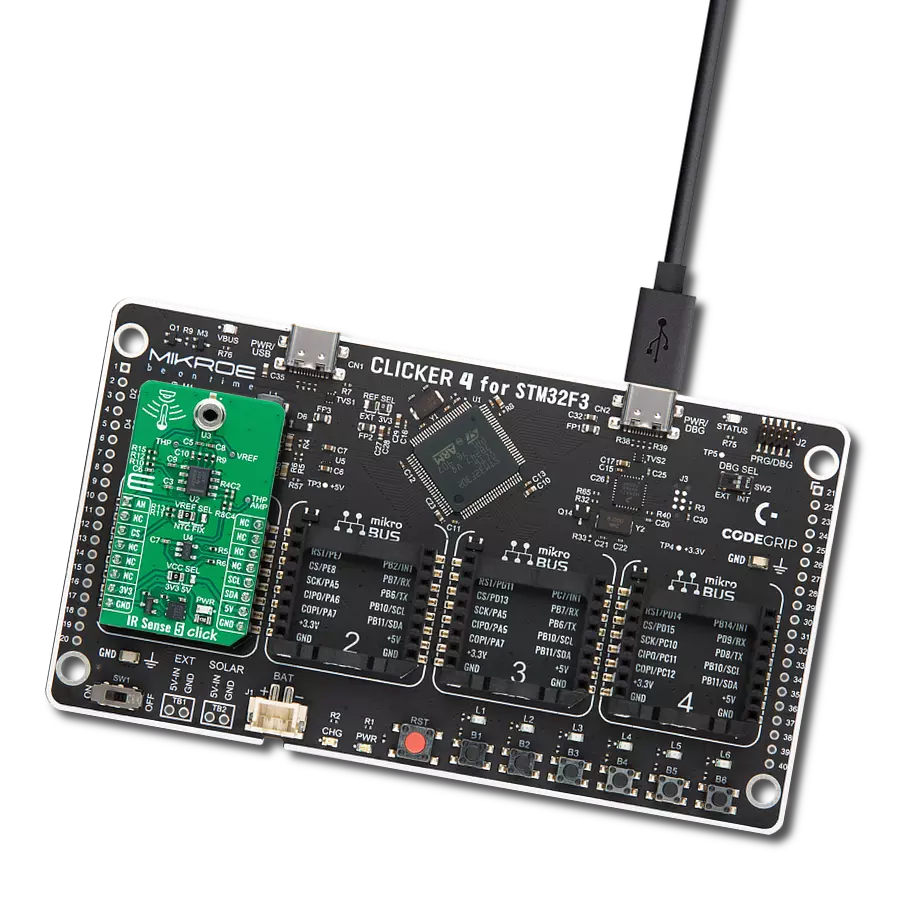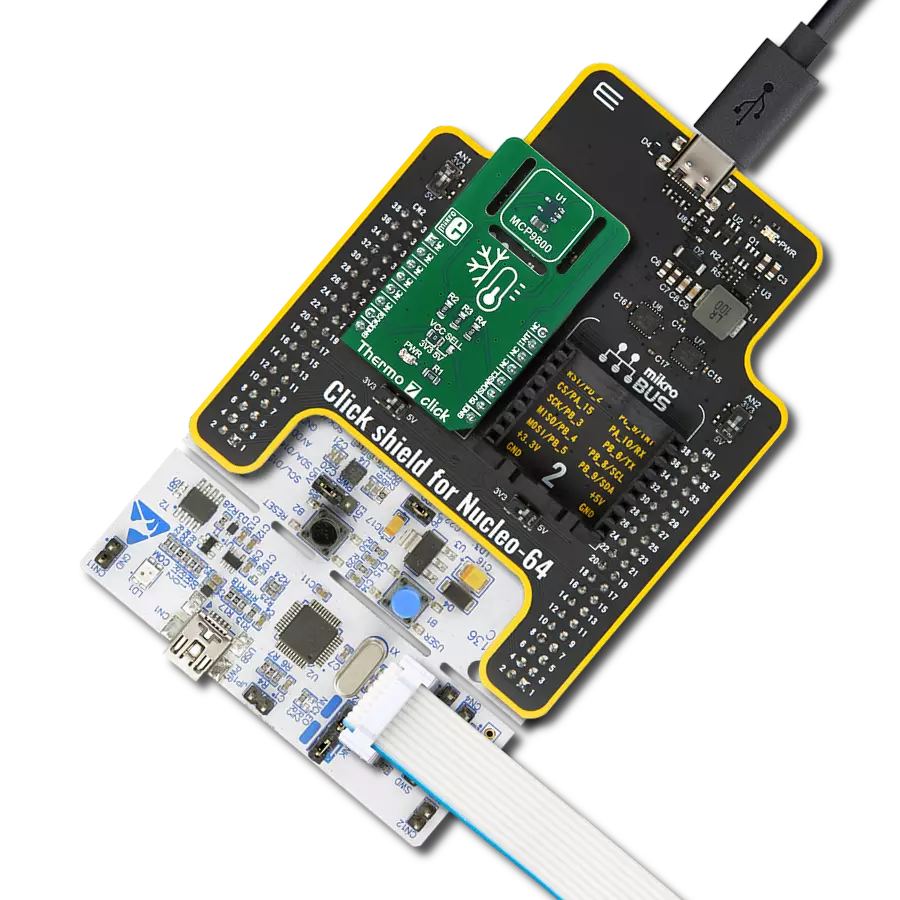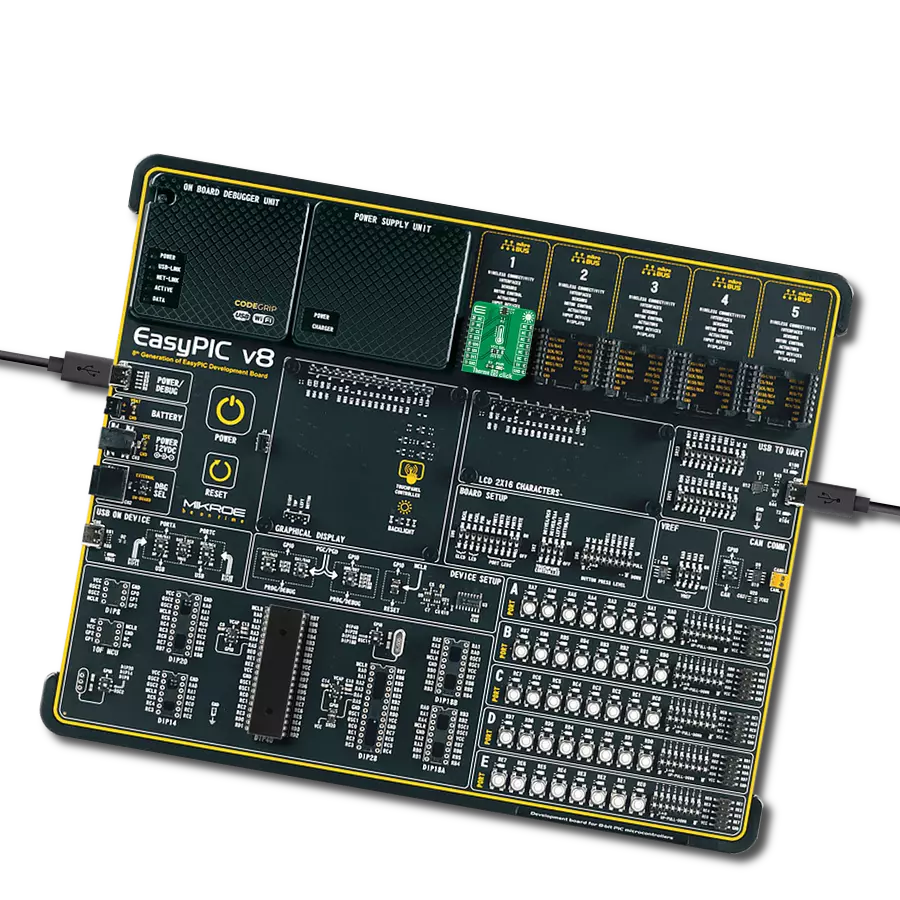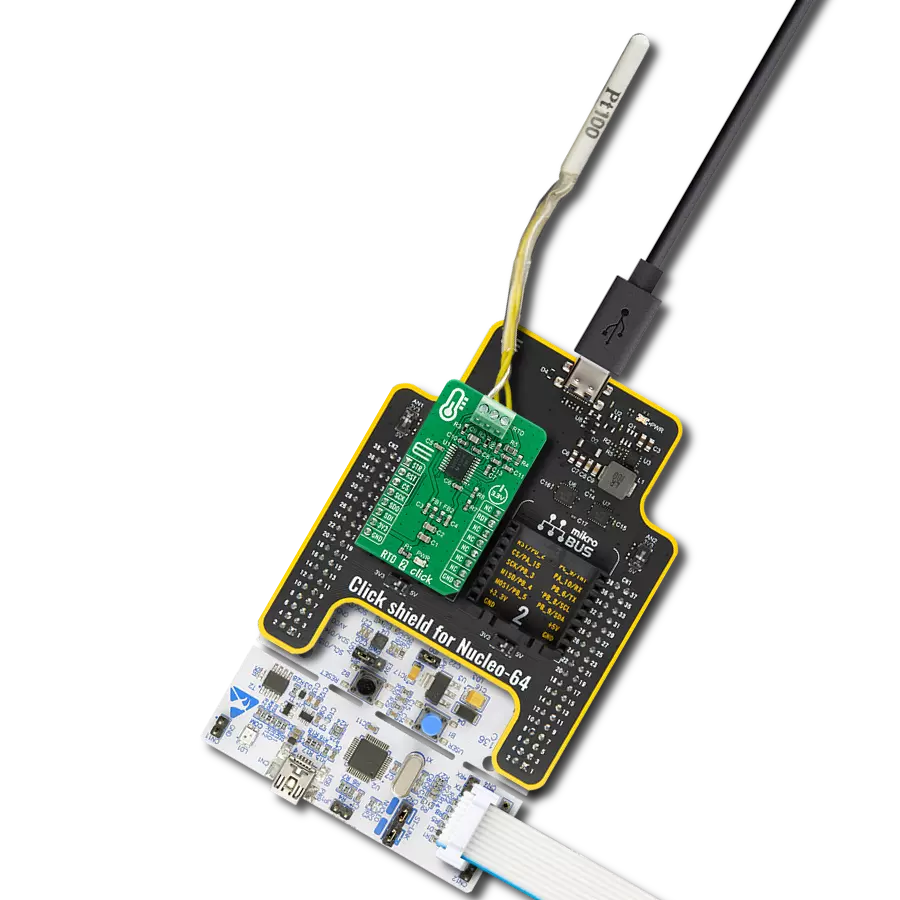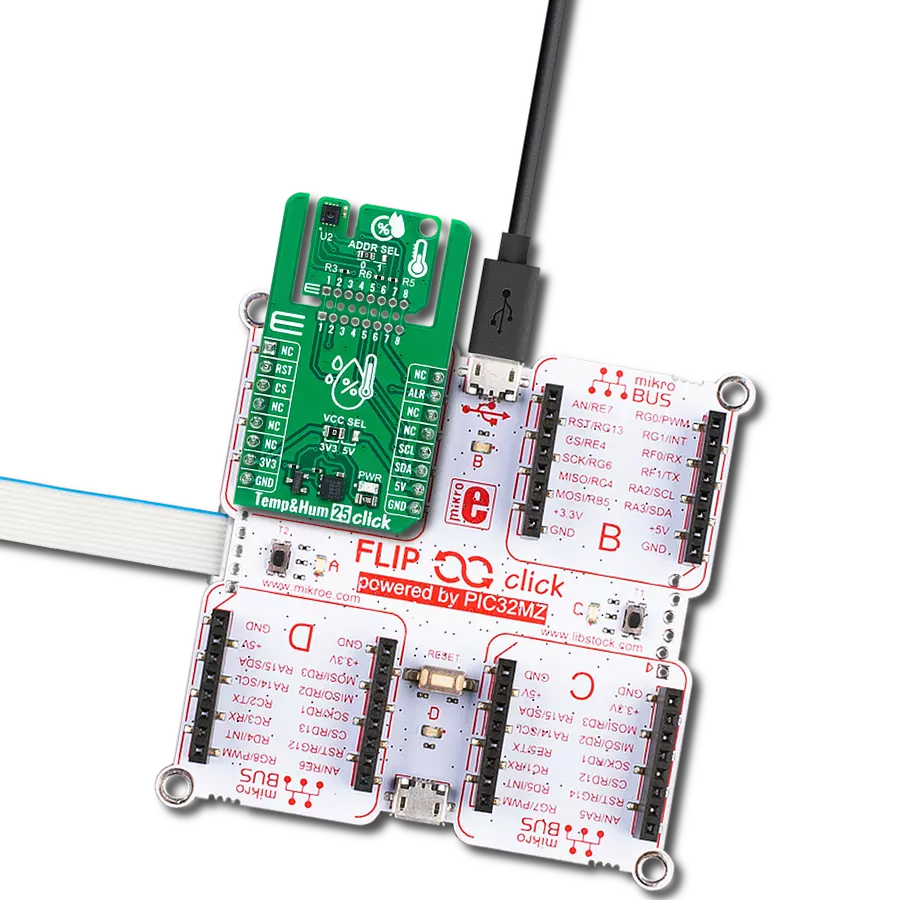Our cutting-edge solution serves as a K-Type thermocouple probe interface, offering unparalleled accuracy and control for all your temperature measurement needs
A
A
Hardware Overview
How does it work?
Thermo K Click is based on the MCP9600, a thermocouple EMF to temperature converter from Microchip. This converter typically has an accuracy of ±0.5°C for thermocouple hot-junction with very good hot and cold-junctions resolution of +0.0625°C. It features four programmable temperature alert outputs that monitor hot or cold-junction temperature, detects rising or falling temperature, and has up to 255°C of programmable hysteresis. In addition, it comes with integrated cold-junction compensation, and the correction coefficients are derived from the NIST Institute database. The Delta-Sigma ADC converter can work in 12/14/16/18-bit selectable resolutions, which is useful for detecting fast temperature transients. The MCP9600 provides
integrated thermocouple open-circuit and short-circuit detection, with an alert signal when the thermocouple wire is broken or disconnected, a feature that comes in handy. In the same way, the alert signal is asserted if the thermocouple wire is shorted to the ground or power. Regarding the alert, the MCP9600 will also notify the wrong polarity either in the Comparator or Interrupt modes. The Comparator mode is helpful for thermostat-type applications to switch fan controllers, LEDs, and more, while the Interrupt mode is more convenient for microprocessor-based systems. The low-power segment comes in Shutdown mode and Burst mode with 1 up to 128 temperature samples. The Thermo K Click uses a standard 2-Wire I2C interface to communicate
with the host MCU, supporting standard 100KHz frequency. The four alert outputs from the MCP9600 can be observed over the AL1, AL2, AL3, and AL4 pins of the mikroBUS™ socket. These are programmable push-pull outputs. The Thermo K Click comes with a PCC-SMP connector for connecting an appropriate probe that MIKROE offers, the K-type Glass Braid Insulated probe. This Click board™ can operate with either 3.3V or 5V logic voltage levels selected via the PWR SEL jumper. This way, both 3.3V and 5V capable MCUs can use the communication lines properly. Also, this Click board™ comes equipped with a library containing easy-to-use functions and an example code that can be used as a reference for further development.
Features overview
Development board
PIC18F57Q43 Curiosity Nano evaluation kit is a cutting-edge hardware platform designed to evaluate microcontrollers within the PIC18-Q43 family. Central to its design is the inclusion of the powerful PIC18F57Q43 microcontroller (MCU), offering advanced functionalities and robust performance. Key features of this evaluation kit include a yellow user LED and a responsive
mechanical user switch, providing seamless interaction and testing. The provision for a 32.768kHz crystal footprint ensures precision timing capabilities. With an onboard debugger boasting a green power and status LED, programming and debugging become intuitive and efficient. Further enhancing its utility is the Virtual serial port (CDC) and a debug GPIO channel (DGI
GPIO), offering extensive connectivity options. Powered via USB, this kit boasts an adjustable target voltage feature facilitated by the MIC5353 LDO regulator, ensuring stable operation with an output voltage ranging from 1.8V to 5.1V, with a maximum output current of 500mA, subject to ambient temperature and voltage constraints.
Microcontroller Overview
MCU Card / MCU
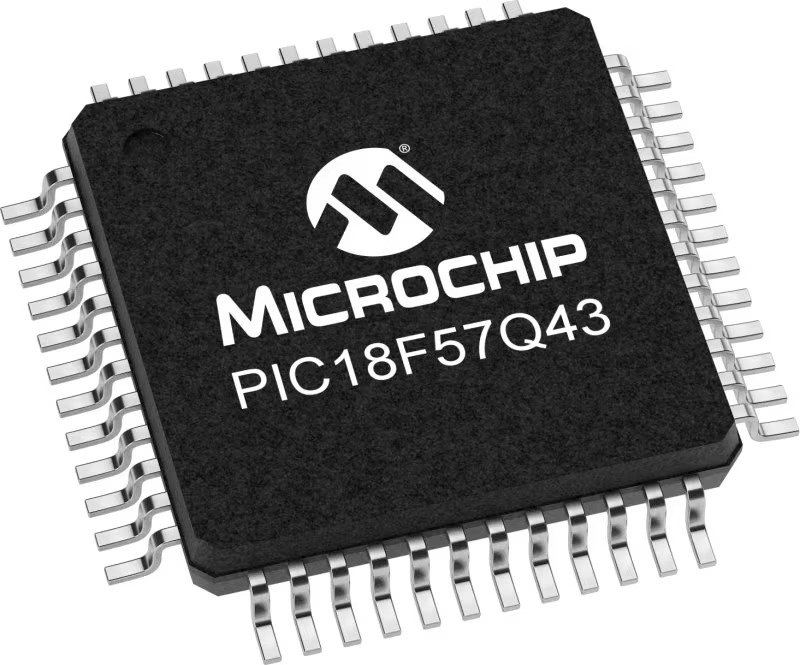
Architecture
PIC
MCU Memory (KB)
128
Silicon Vendor
Microchip
Pin count
48
RAM (Bytes)
8196
You complete me!
Accessories
Curiosity Nano Base for Click boards is a versatile hardware extension platform created to streamline the integration between Curiosity Nano kits and extension boards, tailored explicitly for the mikroBUS™-standardized Click boards and Xplained Pro extension boards. This innovative base board (shield) offers seamless connectivity and expansion possibilities, simplifying experimentation and development. Key features include USB power compatibility from the Curiosity Nano kit, alongside an alternative external power input option for enhanced flexibility. The onboard Li-Ion/LiPo charger and management circuit ensure smooth operation for battery-powered applications, simplifying usage and management. Moreover, the base incorporates a fixed 3.3V PSU dedicated to target and mikroBUS™ power rails, alongside a fixed 5.0V boost converter catering to 5V power rails of mikroBUS™ sockets, providing stable power delivery for various connected devices.
The Type-K thermocouple, equipped with glass braid insulation, is a versatile tool designed for precision temperature measurements, particularly in high-temperature environments. With a calibrated Type-K configuration and a 24 AWG gage wire spanning 2 meters, this probe is engineered to provide reliable readings. Its operational temperature range extends to 480°C (900°F), making it suitable for demanding applications. The glass braid insulation ensures durability and stability during measurements, and the connector body can withstand temperatures up to 220°C (425°F). The Type-K thermocouple probe features a PCC-SMP connector at its end, which offers compatibility with THERMO Click and Thermo K Click boards. This connectivity makes it a valuable tool for various industrial and scientific settings, where precision and reliability in temperature monitoring are essential.
Used MCU Pins
mikroBUS™ mapper
Take a closer look
Click board™ Schematic
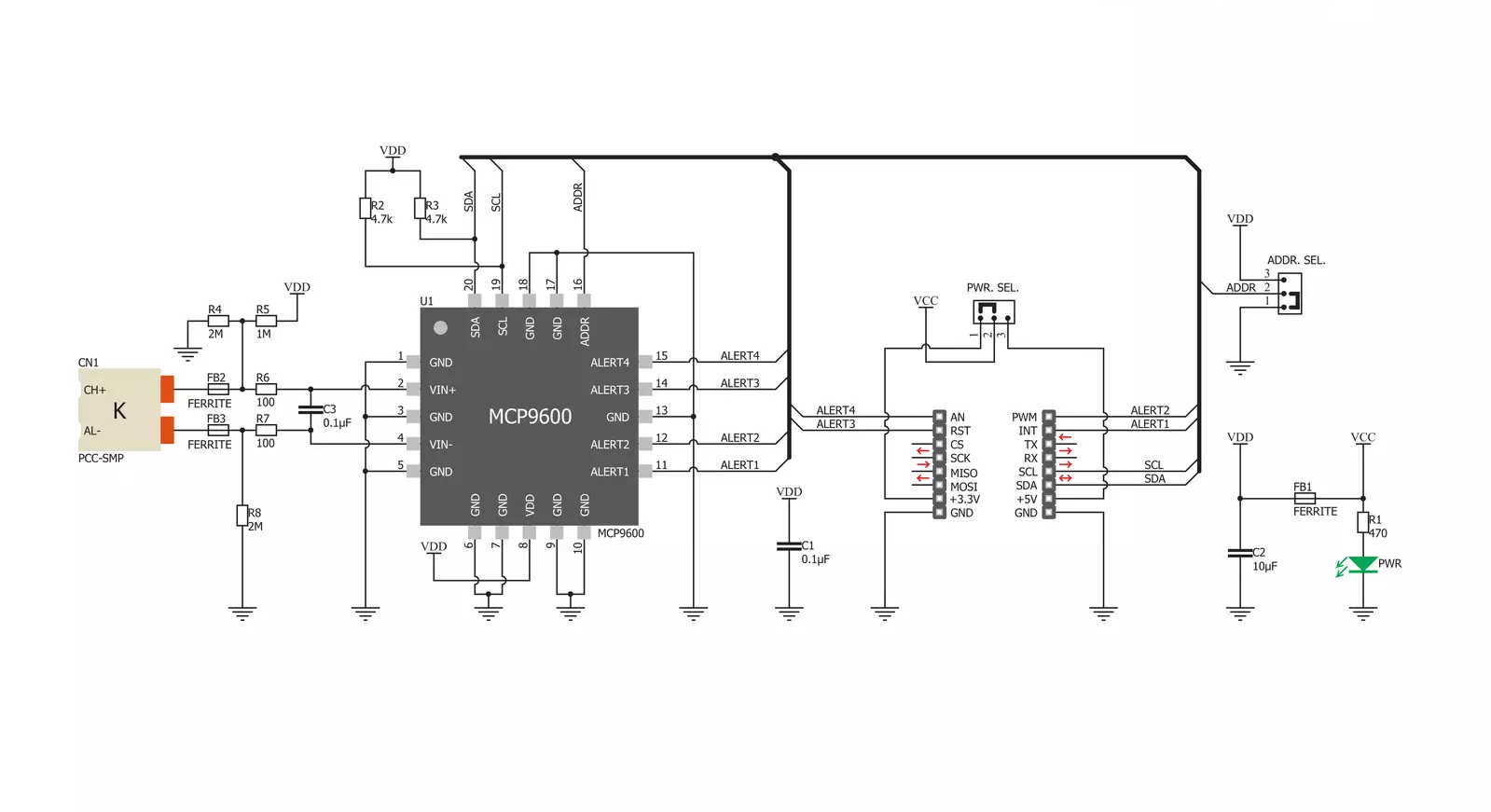
Step by step
Project assembly
Software Support
Library Description
This library contains API for Thermo K Click driver.
Key functions:
thermok_get_temperature- Temperature datathermok_get_status- Get statusthermok_get_device_info- Functions for read device info
Open Source
Code example
The complete application code and a ready-to-use project are available through the NECTO Studio Package Manager for direct installation in the NECTO Studio. The application code can also be found on the MIKROE GitHub account.
/*!
* \file
* \brief ThermoK Click example
*
* # Description
* Demo application shows basic temperature reading using Thermo K Click.
*
* The demo application is composed of two sections :
*
* ## Application Init
* Configuring Clicks and log objects.
* Reads the device ID and also checks the Click and MCU communication.
*
* ## Application Task
* Reads Temperature data(Type K probe) and this data logs to USBUART every 500ms.
*
* \author Katarina Perendic
*
*/
// ------------------------------------------------------------------- INCLUDES
#include "board.h"
#include "log.h"
#include "thermok.h"
// ------------------------------------------------------------------ VARIABLES
static thermok_t thermok;
static log_t logger;
static uint16_t device_info;
// ------------------------------------------------------ APPLICATION FUNCTIONS
void application_init ( void )
{
log_cfg_t log_cfg;
thermok_cfg_t cfg;
/**
* Logger initialization.
* Default baud rate: 115200
* Default log level: LOG_LEVEL_DEBUG
* @note If USB_UART_RX and USB_UART_TX
* are defined as HAL_PIN_NC, you will
* need to define them manually for log to work.
* See @b LOG_MAP_USB_UART macro definition for detailed explanation.
*/
LOG_MAP_USB_UART( log_cfg );
log_init( &logger, &log_cfg );
log_info( &logger, "---- Application Init ----" );
// Click initialization.
thermok_cfg_setup( &cfg );
THERMOK_MAP_MIKROBUS( cfg, MIKROBUS_1 );
thermok_init( &thermok, &cfg );
// Check communication and reads device ID
device_info = thermok_get_device_info( &thermok );
if ( ( device_info >> 8 ) == THERMOK_DEVICE_ID )
{
log_info(&logger, "---- Communication OK!!! ----" );
}
else
{
log_info(&logger, "---- Communication ERROR!!! ----" );
for ( ; ; );
}
Delay_1sec( );
}
void application_task ( void )
{
float temperature;
// Task implementation.
temperature = thermok_get_temperature( &thermok,
THERMOK_REG_HOT_JUNCTION_TEMP_THR,
THERMOK_TEMP_IN_CELSIUS );
log_printf( &logger, ">> Temperature is %.2f C\r\n", temperature );
Delay_ms ( 1000 );
Delay_ms ( 500 );
}
int main ( void )
{
/* Do not remove this line or clock might not be set correctly. */
#ifdef PREINIT_SUPPORTED
preinit();
#endif
application_init( );
for ( ; ; )
{
application_task( );
}
return 0;
}
// ------------------------------------------------------------------------ END
Additional Support
Resources
Category:Temperature & humidity
